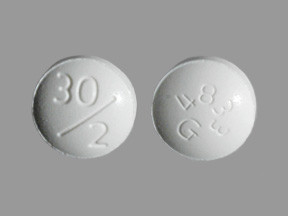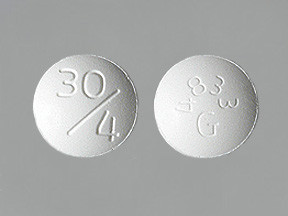PIOGLITAZONE/GLIMEPIRIDE - ORAL
PHONETIC PRONUNCIATION: (PYE-oh-GLI-ta-zone/glih-MEH-pih-ride)
COMMON BRAND NAME(S): Duetact
GENERIC NAME(S): pioglitazone HCl/glimepiride
Uses
USES: This medication is a combination of 2 drugs, pioglitazone and glimepiride. It is used along with a proper diet and exercise program to control high blood sugar in patients with type 2 diabetes. Controlling high blood sugar helps prevent kidney damage, blindness, nerve problems, loss of limbs, and sexual function problems. Proper control of diabetes may also lessen your risk of a heart attack or stroke. Pioglitazone belongs to a class of drugs known as thiazolidinediones or "glitazones." It works by helping to restore your body's proper response to insulin, thereby lowering your blood sugar. Talk to your doctor about the risks and benefits of using pioglitazone-containing products. Glimepiride belongs to a class of drugs known as sulfonylureas. It works by causing the release of your body's natural insulin.
How to use PIOGLITAZONE/GLIMEPIRIDE - ORAL
HOW TO USE: Read the Medication Guide provided by your pharmacist before you start taking this medication and each time you get a refill. If you have any questions, ask your doctor or pharmacist. Take this medication by mouth, usually once daily with the first main meal of the day or as directed by your doctor. The dosage is based on your medical condition and response to treatment. Colesevelam can decrease the absorption of glimepiride. If you are taking colesevelam, take this product at least 4 hours before taking colesevelam. Use this medication regularly in order to get the most benefit from it. Remember to take it at the same time each day. Monitor your blood sugar on a regular basis, and share the results with your doctor. It may take up to 2 to 3 months before you get the full benefit of this drug. When switching from individual diabetes drugs to this combination product, your doctor may ask you to check your blood sugar more often to make sure you do not have a sudden attack of low blood sugar (hypoglycemic reaction) when starting this product. (See also Side Effects section.) Follow your doctor's directions carefully.
Side Effects
Precautions
Interactions
Overdose
Images

- color
- white
- shape
- oblong
- imprint
- SZ, 468

- color
- white
- shape
- round
- imprint
- 30/2, 4833G

- color
- white
- shape
- round
- imprint
- 30/4, 4833G
Reviews
Faq for PIOGLITAZONE/GLIMEPIRIDE - ORAL
- Pioglitazone/Glimepiride is an oral medication that combines two diabetes drugs: pioglitazone (a thiazolidinedione) and glimepiride (a sulfonylurea). It is used to control blood sugar levels in people with type 2 diabetes.
- Pioglitazone helps improve insulin sensitivity in the body and reduces glucose production in the liver. Glimepiride stimulates the pancreas to produce more insulin and helps increase the body's response to insulin.
- The common side effects of Pioglitazone/Glimepiride include weight gain, fluid retention, headache, dizziness, fatigue, and low blood sugar (hypoglycemia).
- Pioglitazone/Glimepiride is usually taken once daily with food. It is important to follow the dosage instructions provided by your healthcare provider and never exceed the prescribed dose.
- Pioglitazone/Glimepiride can interact with certain medications, so it is essential to inform your doctor about all the medications you are taking. This includes over-the-counter drugs, vitamins, and herbal supplements.
- Yes, Pioglitazone/Glimepiride can cause low blood sugar. It is important to monitor your blood sugar levels regularly and be aware of the signs and symptoms of low blood sugar such as dizziness, sweating, and confusion.
- The effects of Pioglitazone/Glimepiride can vary from person to person. It may take several weeks for the medication to show its full effect in controlling blood sugar levels.
- Pioglitazone/Glimepiride is not recommended during pregnancy as it may harm the unborn baby. It is important to discuss alternative treatment options with your doctor if you are planning to become pregnant or are already pregnant.
- The use of Pioglitazone/Glimepiride may need to be adjusted in individuals with kidney or liver problems. It is crucial to inform your doctor about any existing kidney or liver conditions before starting this medication.
Warning
WARNING: Pioglitazone may rarely cause or worsen a certain heart problem (heart failure). Tell your doctor right away if you notice any symptoms of heart failure, including: shortness of breath, swelling ankles/feet, unusual tiredness, unusual/sudden weight gain. This medication is not recommended for people with certain types of heart failure. Before using this medication, tell your doctor if you have heart failure.
Disclaimer
IMPORTANT: HOW TO USE THIS INFORMATION: This is a summary and does NOT have all possible information about this product. This information does not assure that this product is safe, effective, or appropriate for you. This information is not individual medical advice and does not substitute for the advice of your health care professional. Always ask your health care professional for complete information about this product and your specific health needs.
No Reviews Yet